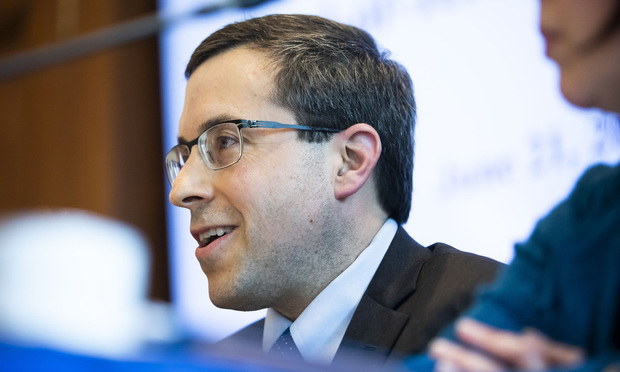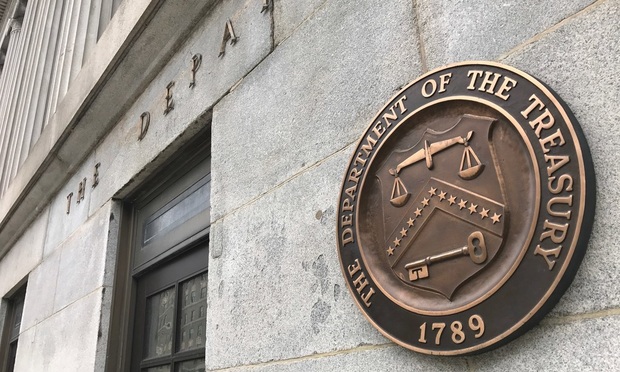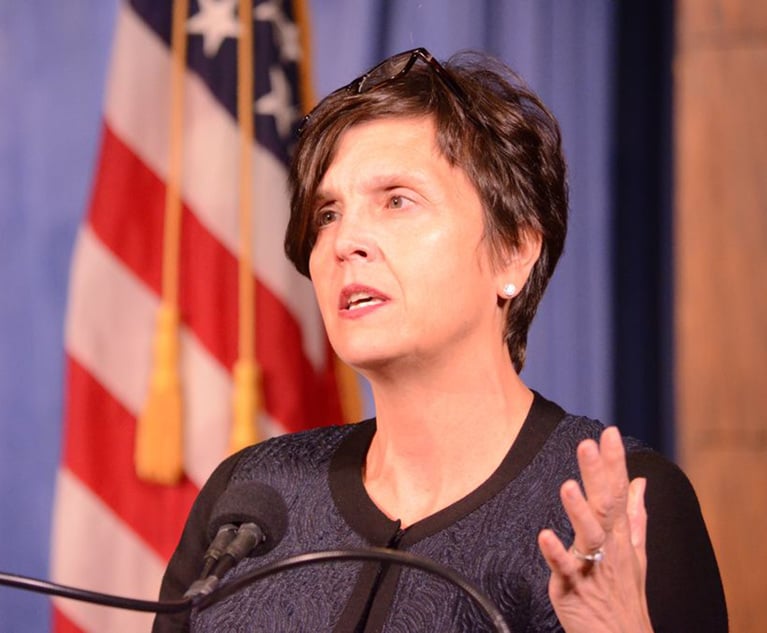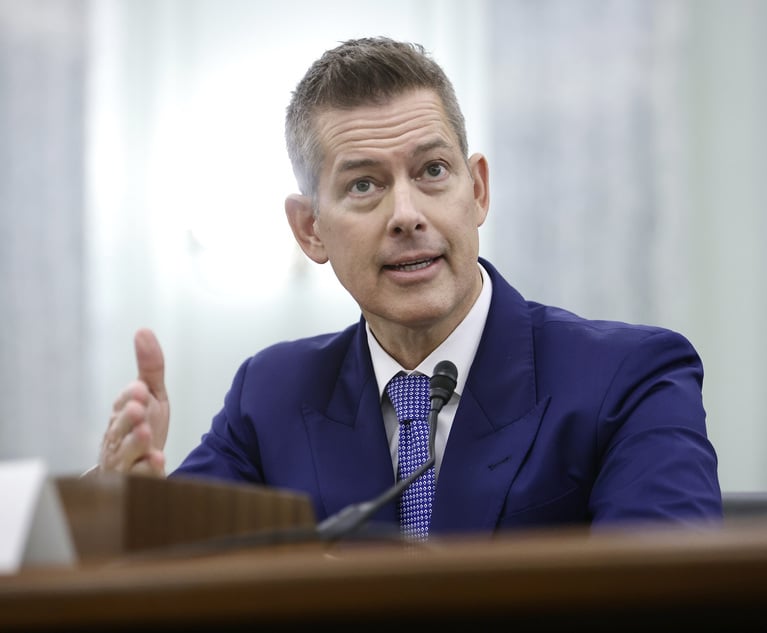At Supreme Court, Fidelity Argues Against Liability Over 'Suspicious Activity Report'
"Financial institutions are absolutely immune from private suits that are based on the filing of a suspicious activity report," lawyers from Jones Day, on behalf of client Fidelity Brokerage Services, told the U.S. Supreme Court on Monday.
January 06, 2020 at 03:24 PM
4 minute read
 Shay Dvoretzky, partner at Jones Day. Credit: Diego M. Radzinschi / ALM
Shay Dvoretzky, partner at Jones Day. Credit: Diego M. Radzinschi / ALM
Lawyers for the investment services provider Fidelity Brokerage Services LLC on Monday asked the U.S. Supreme Court to keep in place a federal appeals court ruling that said the company could not be held liable in a private lawsuit for merely telling U.S. financial regulators about an allegedly suspicious stock transaction.
Fidelity, represented by the law firm Jones Day, is vying to leave undisturbed an April 2019 decision from the U.S. Court of Appeals for the First Circuit. A provision of the federal Bank Secrecy Act accords immunity to financial institutions that make voluntary and confidential disclosures called "suspicious activity reports." These submissions, widely known by their acronym SARs, help federal authorities investigate potential financial misconduct.
The Jones Day team, led by partner Shay Dvoretzky, is contesting a Supreme Court petition filed in September by AER Advisors Inc. and two of its clients, William J. Deutsch, who is chairman of Deutsch Family Wine & Spirits, and his son Peter Deutsch, who serves as the company's chief executive officer. The Deutsches and AER Advisors are represented by Howard Graff, an Arent Fox counsel in New York.
The dispute involves allegations of stock-price manipulation. Fidelity's filing of a suspicious activity report—submitted to the U.S. Treasury Department's Financial Crimes Enforcement Network—triggered a U.S. Securities and Exchange Commission investigation in 2012. Peter Deutsch and AER each said they spent hundreds of thousands of dollars defending themselves. Neither the SEC nor any state agency brought an enforcement action against AER or Peter Deutsch.
"Petitioners brought this action against Fidelity seeking redress for Fidelity's fraudulent concealment of its own conduct, a cover-up of its illicit lending practices and market manipulation that created a short squeeze," Graff said in the petition. He argued it was Fidelity's transaction conduct, and nothing that AER and the Deutsches did, that caused a "market disruption" in shares of a company called China Medical Technologies Inc.
Graff asserted on behalf of AER and the Deutsches: "As a result of being falsely accused by Fidelity in a SAR, petitioners were subject to investigations by various state and federal securities-related agencies, and the Deutsches suffered additional business-related damages to their business—Deutsch Family Wine & Spirits—that negatively impacted the value of the equity in it."
 U.S. Treasury Department in Washington. Credit: Mike Scarcella
U.S. Treasury Department in Washington. Credit: Mike ScarcellaDvoretzky of Jones Day countered Monday that the two federal appellate courts that have looked at liability in this area of the law have all "held that a financial institution is absolutely immune from a private suit that is based on that filing."
The history of the Bank Secrecy Act, Dvoretzky wrote, "as well as policy considerations, all confirm that the court below reached the right decision. Financial institutions are absolutely immune from private suits that are based on the filing of a suspicious activity report."
Fidelity's lawyers also argued that AER and the Deutsches would face a particular challenge trying to prove their case. Federal law prohibits financial institutions from revealing suspicious activity reports.
"Petitioners do not have the alleged report or know its contents," Dvoretzky wrote in Fidelity's new filing. "And the Bank Secrecy Act forbids Fidelity from revealing the contents of any suspicious activity report, or even whether a report exists. So petitioners could never prove that a suspicious activity report was even filed, much less that the filing was in some respect improper."
Graff of Arent Fox has urged the Supreme Court to apply a "good faith" test in weighing whether Fidelity can face liability for filing a suspicious activity report. The disclosure of a suspicious activity report must be related to a "possible violation of law or regulation," Graff told the justices. He argued that it was impossible AER and the Deutsches had engineered any sort of price manipulation scheme.
"Absolute immunity permits financial institutions such as Fidelity (as petitioners allege) to act with impunity and wastes the resources of the government agencies involved in investigating SARs," Graff told the court.
This content has been archived. It is available through our partners, LexisNexis® and Bloomberg Law.
To view this content, please continue to their sites.
Not a Lexis Subscriber?
Subscribe Now
Not a Bloomberg Law Subscriber?
Subscribe Now
NOT FOR REPRINT
© 2025 ALM Global, LLC, All Rights Reserved. Request academic re-use from www.copyright.com. All other uses, submit a request to [email protected]. For more information visit Asset & Logo Licensing.
You Might Like
View All
'Lack of Independence' or 'Tethered to the Law'? Witnesses Speak on Bondi
4 minute read


DOT Nominee Duffy Pledges Safety, Faster Infrastructure Spending in Confirmation Hearing
Trending Stories
- 1Bribery Case Against Former Lt. Gov. Brian Benjamin Is Dropped
- 2‘Extremely Disturbing’: AI Firms Face Class Action by ‘Taskers’ Exposed to Traumatic Content
- 3State Appeals Court Revives BraunHagey Lawsuit Alleging $4.2M Unlawful Wire to China
- 4Invoking Trump, AG Bonta Reminds Lawyers of Duties to Noncitizens in Plea Dealing
- 522-Count Indictment Is Just the Start of SCOTUSBlog Atty's Legal Problems, Experts Say
Who Got The Work
J. Brugh Lower of Gibbons has entered an appearance for industrial equipment supplier Devco Corporation in a pending trademark infringement lawsuit. The suit, accusing the defendant of selling knock-off Graco products, was filed Dec. 18 in New Jersey District Court by Rivkin Radler on behalf of Graco Inc. and Graco Minnesota. The case, assigned to U.S. District Judge Zahid N. Quraishi, is 3:24-cv-11294, Graco Inc. et al v. Devco Corporation.
Who Got The Work
Rebecca Maller-Stein and Kent A. Yalowitz of Arnold & Porter Kaye Scholer have entered their appearances for Hanaco Venture Capital and its executives, Lior Prosor and David Frankel, in a pending securities lawsuit. The action, filed on Dec. 24 in New York Southern District Court by Zell, Aron & Co. on behalf of Goldeneye Advisors, accuses the defendants of negligently and fraudulently managing the plaintiff's $1 million investment. The case, assigned to U.S. District Judge Vernon S. Broderick, is 1:24-cv-09918, Goldeneye Advisors, LLC v. Hanaco Venture Capital, Ltd. et al.
Who Got The Work
Attorneys from A&O Shearman has stepped in as defense counsel for Toronto-Dominion Bank and other defendants in a pending securities class action. The suit, filed Dec. 11 in New York Southern District Court by Bleichmar Fonti & Auld, accuses the defendants of concealing the bank's 'pervasive' deficiencies in regards to its compliance with the Bank Secrecy Act and the quality of its anti-money laundering controls. The case, assigned to U.S. District Judge Arun Subramanian, is 1:24-cv-09445, Gonzalez v. The Toronto-Dominion Bank et al.
Who Got The Work
Crown Castle International, a Pennsylvania company providing shared communications infrastructure, has turned to Luke D. Wolf of Gordon Rees Scully Mansukhani to fend off a pending breach-of-contract lawsuit. The court action, filed Nov. 25 in Michigan Eastern District Court by Hooper Hathaway PC on behalf of The Town Residences LLC, accuses Crown Castle of failing to transfer approximately $30,000 in utility payments from T-Mobile in breach of a roof-top lease and assignment agreement. The case, assigned to U.S. District Judge Susan K. Declercq, is 2:24-cv-13131, The Town Residences LLC v. T-Mobile US, Inc. et al.
Who Got The Work
Wilfred P. Coronato and Daniel M. Schwartz of McCarter & English have stepped in as defense counsel to Electrolux Home Products Inc. in a pending product liability lawsuit. The court action, filed Nov. 26 in New York Eastern District Court by Poulos Lopiccolo PC and Nagel Rice LLP on behalf of David Stern, alleges that the defendant's refrigerators’ drawers and shelving repeatedly break and fall apart within months after purchase. The case, assigned to U.S. District Judge Joan M. Azrack, is 2:24-cv-08204, Stern v. Electrolux Home Products, Inc.
Featured Firms
Law Offices of Gary Martin Hays & Associates, P.C.
(470) 294-1674
Law Offices of Mark E. Salomone
(857) 444-6468
Smith & Hassler
(713) 739-1250










